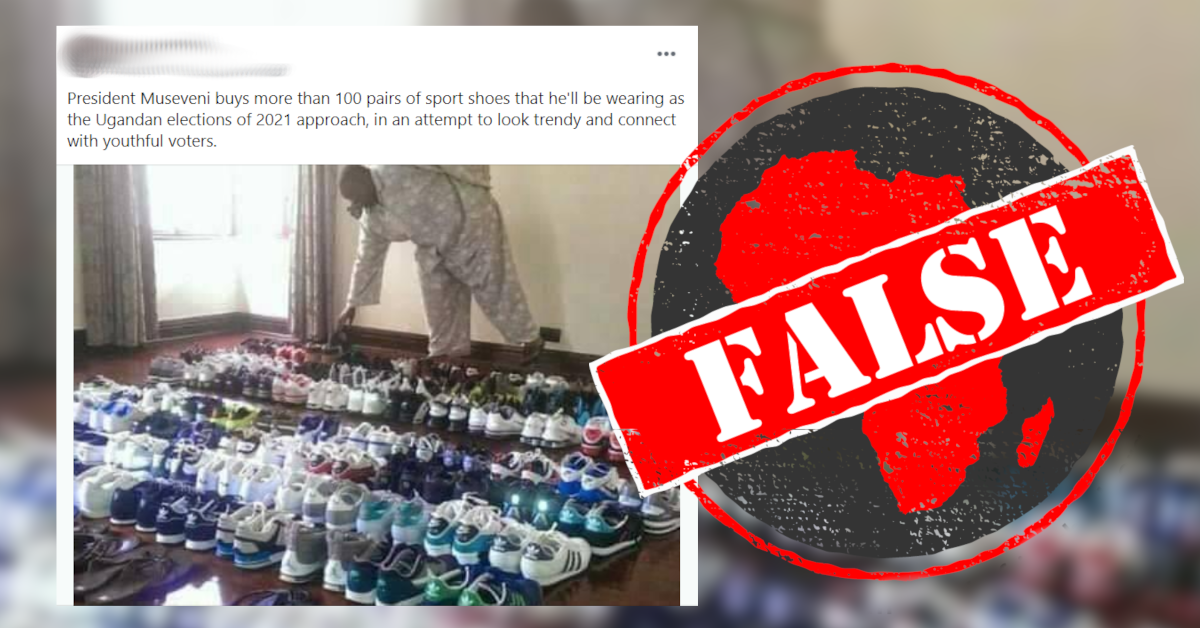A photo posted on Facebook shows a man inspecting one of dozens of sneakers lined up in rows on the floor of an otherwise empty room.
“President Museveni buys more than 100 pairs of sport shoes that he'll be wearing as the Ugandan elections of 2021 approach, in an attempt to look trendy and connect with youthful voters,” the caption of the 11 August 2020 post reads.
Yoweri Museveni has been president of Uganda since 1986. He has recently been posting fitness videos online to encourage Ugandans to stay at home during the Covid-19 pandemic, and announced new programmes for young people in July.
But does the photo show Museveni with a collection of sneakers he bought to look trendy in his campaign for the 2021 elections?

Reverse image searches using Bing and TinEye led us to Zimbabwean webpages. The TinEye results indicated that the photo has been online since at least April 2015.
We then searched Facebook and found a larger version of the photo, posted on 15 April 2015 and identifying the man as one Wicknell Chivayo.
The Bing search led us to a 30 March 2018 article on My Zimbabwe News, also naming the man as Chivayo.
We reached out to the news site to find out more about photo. Its administrator told us: “He's a young Zimbabwean businessman. He was showing off his shoe collection. His name is Sir Wicknell Chivayo.”
Chivayo has posted photos of dozens of pairs of shoes on his Instagram and Facebook pages.
The photo does not show Museveni with sneakers he bought for his election campaign. – Grace Gichuhi
“President Museveni buys more than 100 pairs of sport shoes that he'll be wearing as the Ugandan elections of 2021 approach, in an attempt to look trendy and connect with youthful voters,” the caption of the 11 August 2020 post reads.
Yoweri Museveni has been president of Uganda since 1986. He has recently been posting fitness videos online to encourage Ugandans to stay at home during the Covid-19 pandemic, and announced new programmes for young people in July.
But does the photo show Museveni with a collection of sneakers he bought to look trendy in his campaign for the 2021 elections?

Zimbabwean businessman Sir Wicknell Chivayo
Reverse image searches using Bing and TinEye led us to Zimbabwean webpages. The TinEye results indicated that the photo has been online since at least April 2015.
We then searched Facebook and found a larger version of the photo, posted on 15 April 2015 and identifying the man as one Wicknell Chivayo.
The Bing search led us to a 30 March 2018 article on My Zimbabwe News, also naming the man as Chivayo.
We reached out to the news site to find out more about photo. Its administrator told us: “He's a young Zimbabwean businessman. He was showing off his shoe collection. His name is Sir Wicknell Chivayo.”
Chivayo has posted photos of dozens of pairs of shoes on his Instagram and Facebook pages.
The photo does not show Museveni with sneakers he bought for his election campaign. – Grace Gichuhi
Republish our content for free
For publishers: what to do if your post is rated false
A fact-checker has rated your Facebook or Instagram post as “false”, “altered”, “partly false” or “missing context”. This could have serious consequences. What do you do?
Click on our guide for the steps you should follow.
Publishers guideAfrica Check teams up with Facebook
Africa Check is a partner in Meta's third-party fact-checking programme to help stop the spread of false information on social media.
The content we rate as “false” will be downgraded on Facebook and Instagram. This means fewer people will see it.
You can also help identify false information on Facebook. This guide explains how.


Add new comment